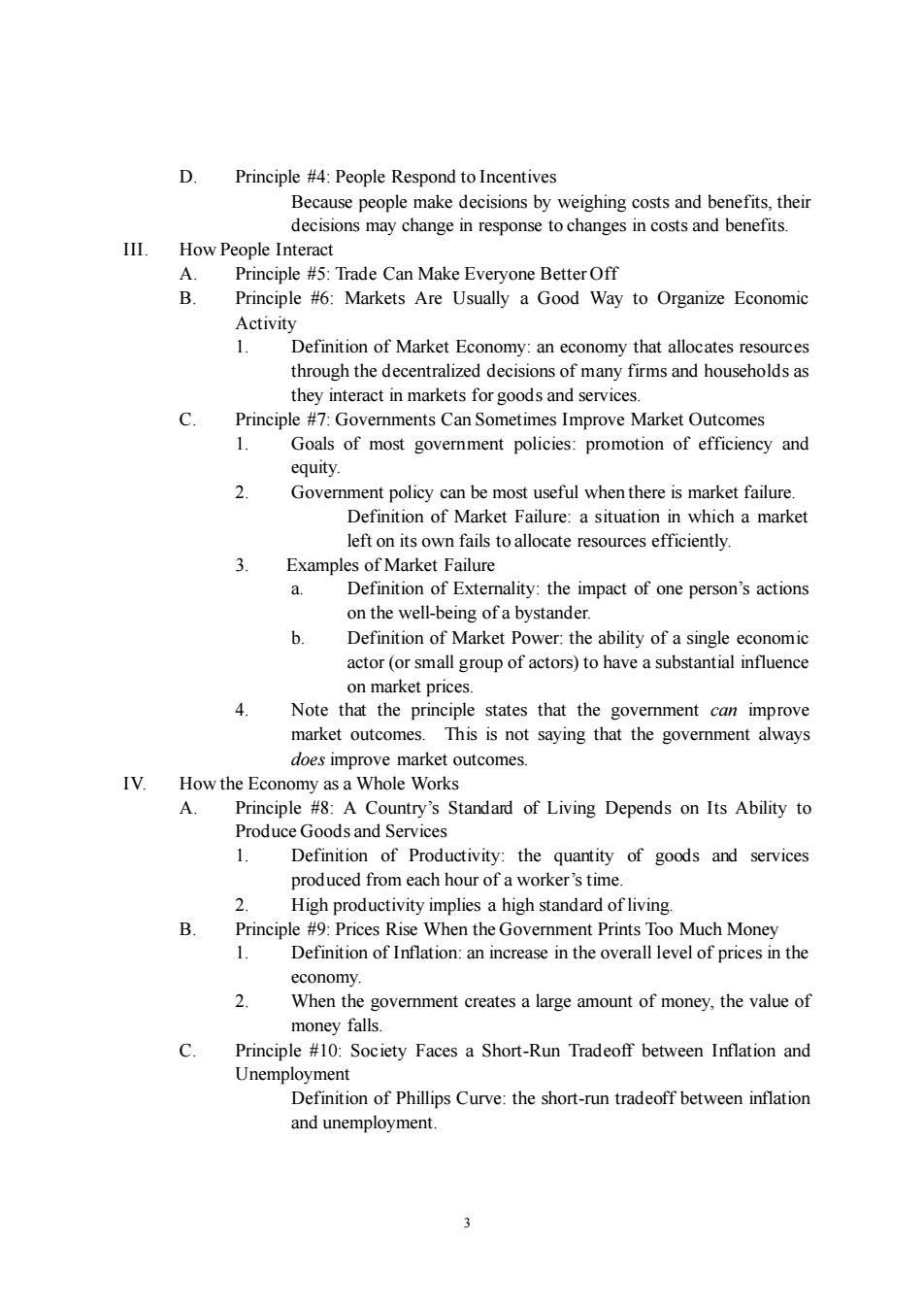正在加载图片...

D. Principle #4:People Respond to Incentives Because people make decisions by weighing costs and benefits,their decisions may change in response to changes in costs and benefits ow People Interact Can Make Everyone Better Off B. Principle #6:Markets Are Usually a Good Way to Organize Economic Activity 1 Definition of Market Economy:an economy that allocates resources through the decentralized decisions of many firms and households as the interact in markets for goods and service Principle #7:Governments Can Sometimes Improve Market Outcomes 1. Goals of most government policies:promotion of efficiency and equity. Goverment policy can be most useful when there is market failure on of Marke Failure:a situatio ch a market left on its own fails to allocate resources efficiently. Examples of Market Failure a. Definition of Externality:the impact of one person's actions on the well-being of a bystander. h Definition of Market Power:the ability of a single economic actor (or small group of actors)to have a substantial influence on market prices. 4. Note that the principle states that the government can improve market outcomes.This is not saying that the government always does improve market outcomes IV. How the Eco nomy as a Whole Works A. Principle #8:A Country's Standard of Living Depends on Its Ability to Produce Goods and Services 1. Definition of Productivity:the quantity of goods and services produced from each hour of a worker's time. 2 Too Much Money Definition of Inflation:an increase in the overall level of prices in the economy 2 When the government creates a large amount of money,the value of money falls Principle #10:Society Faces a Short-Run Tradeoff between Inflation and Unemployment Definition of Phillips Curve:the short-run tradeoff between inflation and unemployment. 3 3 D. Principle #4: People Respond to Incentives Because people make decisions by weighing costs and benefits, their decisions may change in response to changes in costs and benefits. III. How People Interact A. Principle #5: Trade Can Make Everyone Better Off B. Principle #6: Markets Are Usually a Good Way to Organize Economic Activity 1. Definition of Market Economy: an economy that allocates resources through the decentralized decisions of many firms and households as they interact in markets for goods and services. C. Principle #7: Governments Can Sometimes Improve Market Outcomes 1. Goals of most government policies: promotion of efficiency and equity. 2. Government policy can be most useful when there is market failure. Definition of Market Failure: a situation in which a market left on its own fails to allocate resources efficiently. 3. Examples of Market Failure a. Definition of Externality: the impact of one person’s actions on the well-being of a bystander. b. Definition of Market Power: the ability of a single economic actor (or small group of actors) to have a substantial influence on market prices. 4. Note that the principle states that the government can improve market outcomes. This is not saying that the government always does improve market outcomes. IV. How the Economy as a Whole Works A. Principle #8: A Country’s Standard of Living Depends on Its Ability to Produce Goods and Services 1. Definition of Productivity: the quantity of goods and services produced from each hour of a worker’s time. 2. High productivity implies a high standard of living. B. Principle #9: Prices Rise When the Government Prints Too Much Money 1. Definition of Inflation: an increase in the overall level of prices in the economy. 2. When the government creates a large amount of money, the value of money falls. C. Principle #10: Society Faces a Short-Run Tradeoff between Inflation and Unemployment Definition of Phillips Curve: the short-run tradeoff between inflation and unemployment